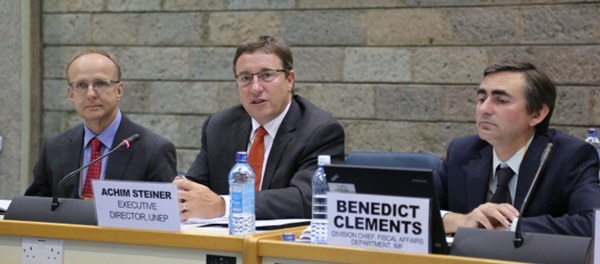Fossil fuel subsidies undermine green economy: UNEP
 0 Comment(s)
0 Comment(s) Print
Print E-mail China.org.cn, April 29, 2014
E-mail China.org.cn, April 29, 2014
Fossil fuel subsidies are contributing to fiscal instability and undermining governments' efforts to combat serious economic and environmental challenges, such as climate change, and the transition to an inclusive green economy, according to experts.
"Reforming Fossil Fuel Subsidies for an Inclusive Green Economy" is the theme of the two-day event co-organized by UNEP, IMF, GIZ and the Global Subsidies Initiative of IISD. Sessions will focus on how fiscal policies can address the perverse effects of fossil fuel subsidies and strengthen government spending for sustainable development. The Intergovernmental Panel on Climate Change recently reported that CO2 emissions from fossil fuel combustion and industrial processes were responsible for approximately 78 per cent of the total increase in greenhouse gas emissions between 1970 and 2010.
Experts say reducing or eliminating harmful fossil fuel subsidies - and properly pricing energy to account for environmental impacts - is one of the most promising ways governments can promote a transition to a greener economy, and even the playing field for investments in energy efficiency and renewable energy.
Subsidies to producers often support inefficient state-owned energy companies and stifle incentives for greater efficiencies and innovation, while subsidies to consumers often encourage excessive consumption, which has knock-on effects for pollution, human health and greenhouse gas emissions.
Globally, fossil fuel subsidies are estimated to be in the range of US$500 billion. When taking into account implicit subsidies from the failure to charge for pollution, climate change and other externalities, the IMF estimates the post-tax subsidy figure is closer to $2 trillion worldwide - equivalent to about 2.9 per cent of global GDP, or 8.5 per cent of government revenues. Furthermore, it finds the removal of such subsidies could lead to a 13 per cent decline in CO2 emissions.







Go to Forum >>0 Comment(s)